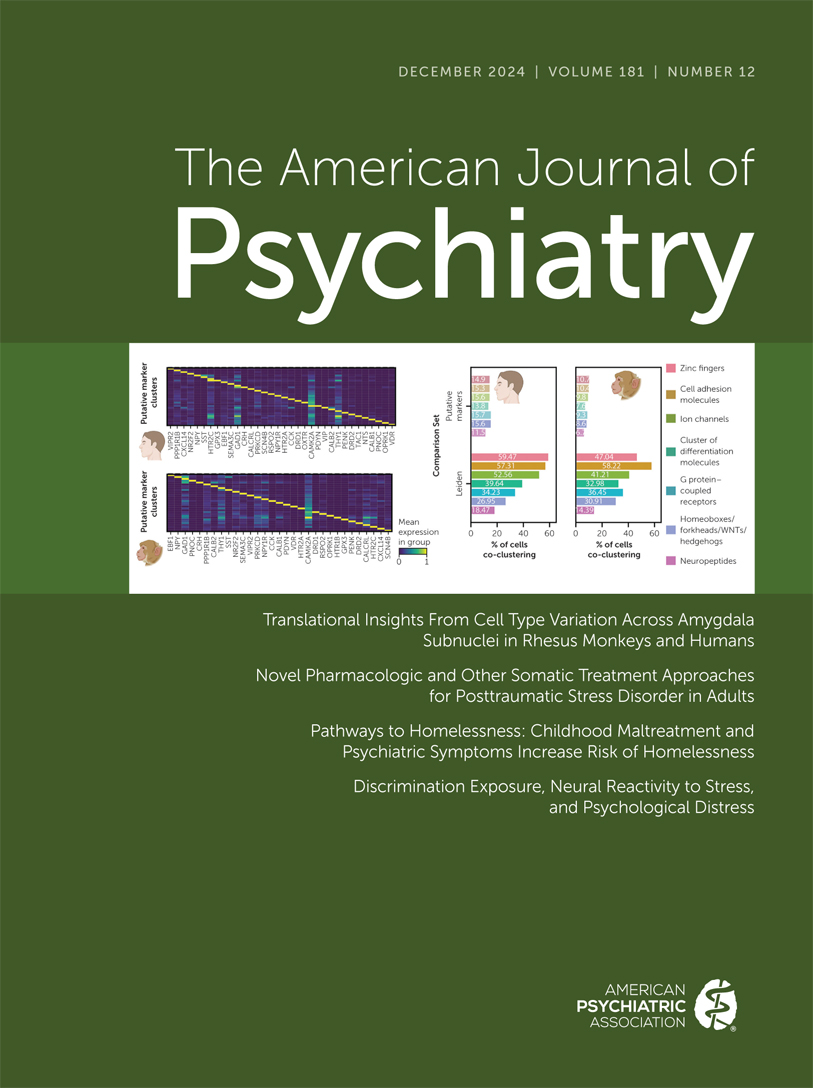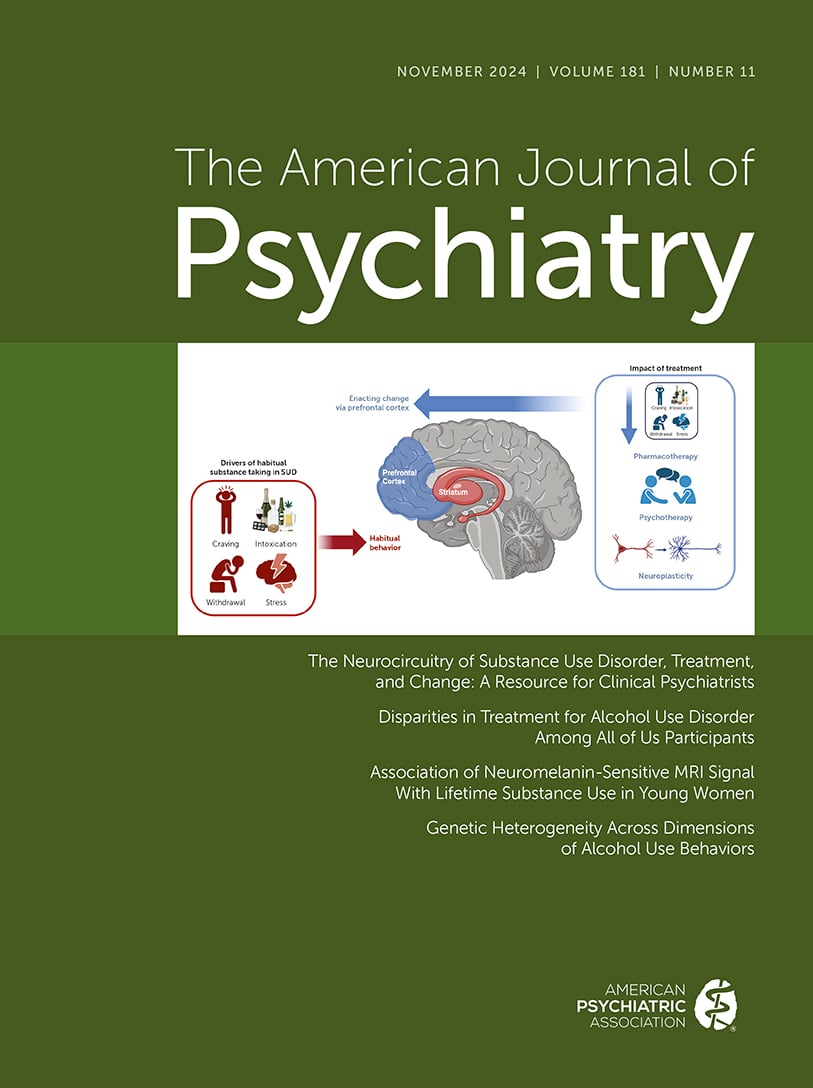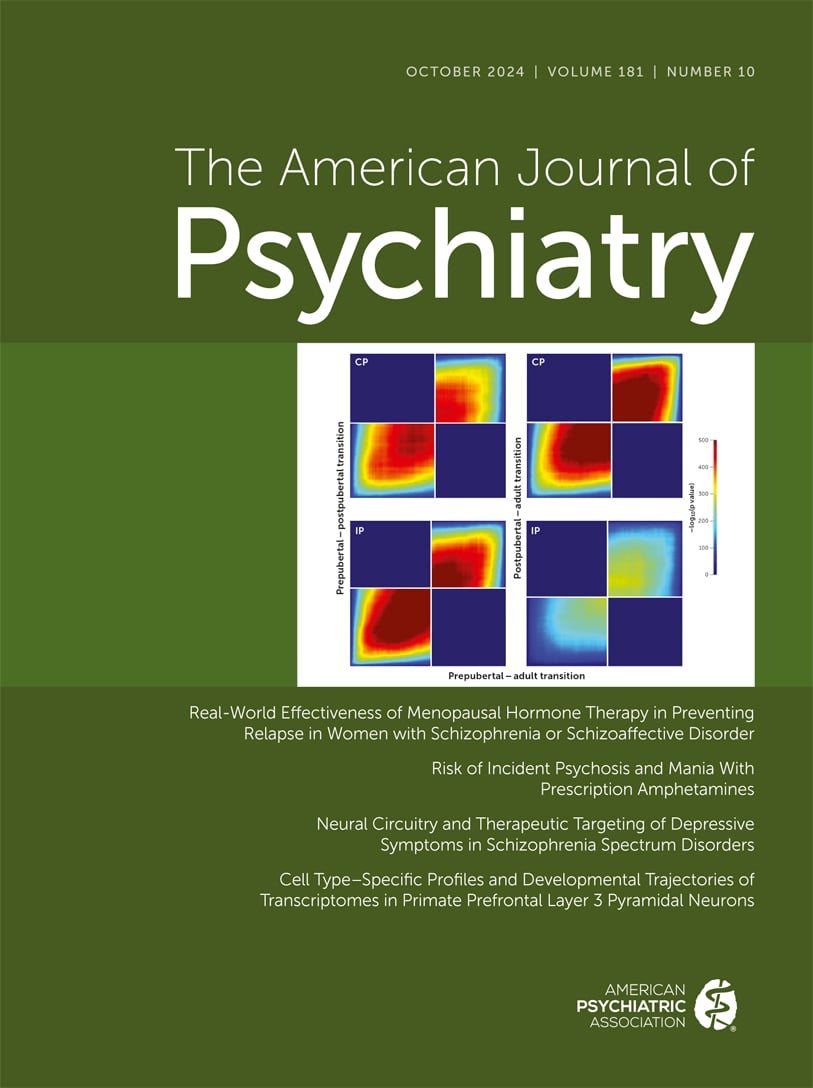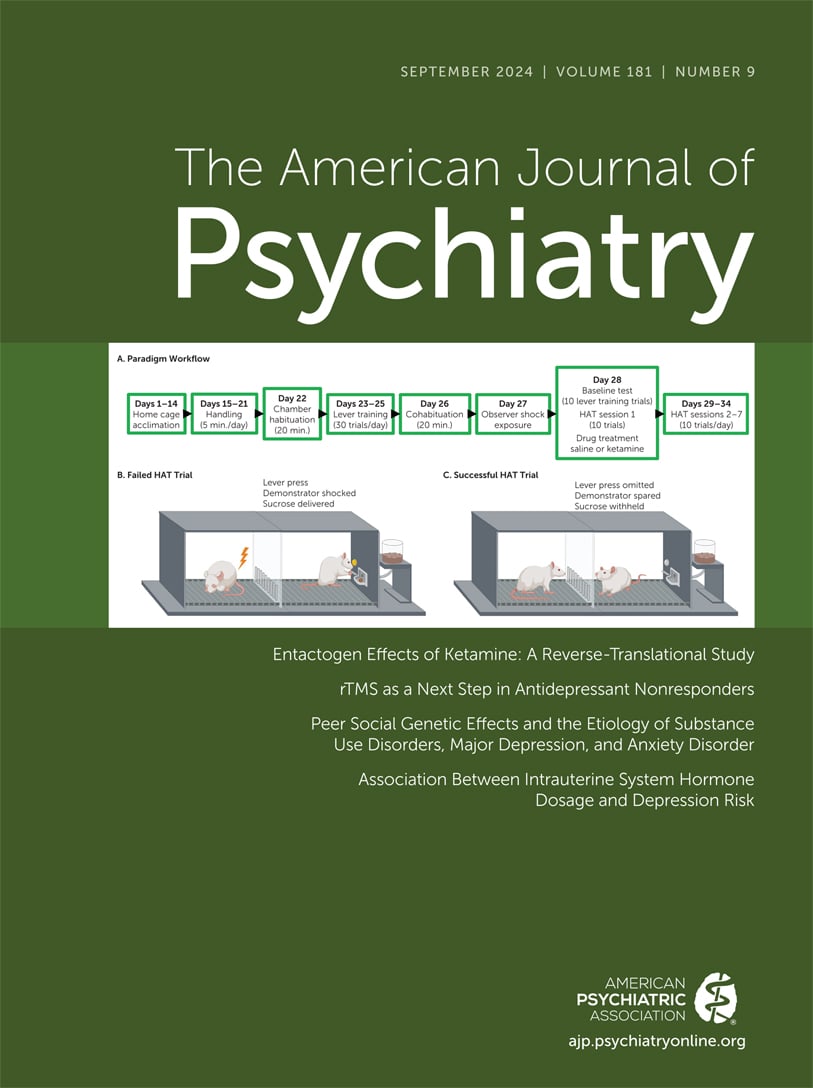American Journal of Psychiatry
- Volume 157
- Number 1
- January 2000
Editorial
Images In Neuroscience
Special Article
Publication date: 01 January 2000
Pages4–15OBJECTIVE: This article reviews evidence indicating that acetylcholinesterase inhibitors have psychotropic properties. METHOD: The author reviewed the English-language literature pertinent to the response of neuropsychiatric symptoms in Alzheimer’s ...
https://doi.org/10.1176/ajp.157.1.4Publication date: 01 January 2000
Pages16–25OBJECTIVE: The authors’ goal was to determine whether patients with schizophrenia differ from comparison subjects in regional brain volumes and whether these differences are similar in male and female subjects. METHOD: They conducted a systematic search ...
https://doi.org/10.1176/ajp.157.1.16Regular Article
Publication date: 01 January 2000
Pages26–33OBJECTIVE: Abnormal activation of the dorsolateral prefrontal cortex and a related cortical network during working memory tasks has been demonstrated in patients with schizophrenia, but the responsible mechanism has not been identified. The present study ...
https://doi.org/10.1176/ajp.157.1.26Publication date: 01 January 2000
Pages34–39OBJECTIVE: The goal was to test the hypothesis that abnormalities of gyrification are present in the prefrontal region of postmortem brains from schizophrenic patients. METHOD: The authors compared the prefrontal regions in brains from 24 schizophrenic ...
https://doi.org/10.1176/ajp.157.1.34Publication date: 01 January 2000
Pages40–47OBJECTIVE: Anomalies of structure and asymmetry of the parahippocampal gyrus (origin of the perforant path input to the hippocampal formation in the medial temporal lobe) have been shown in some postmortem studies of schizophrenia, but previous studies ...
https://doi.org/10.1176/ajp.157.1.40Publication date: 01 January 2000
Pages48–54OBJECTIVE: The purpose of this study was to determine whether schizotypal personality disorder, which has the same genetic diathesis as schizophrenia, manifests abnormalities in whole-brain and CSF volumes. METHOD: Sixteen right-handed and neuroleptic-...
https://doi.org/10.1176/ajp.157.1.48Publication date: 01 January 2000
Pages55–59OBJECTIVE: The schizophrenia spectrum includes individuals with schizophrenia, their relatives, and individuals with schizotypal personality disorder. Subjects in the schizophrenia spectrum have disorders of attention, cognition, and information ...
https://doi.org/10.1176/ajp.157.1.55Publication date: 01 January 2000
Pages60–66OBJECTIVE: The authors examined the duration of untreated psychosis, defined as the interval from first psychotic symptom to first psychiatric hospitalization, in a county-wide sample of first-admission inpatients who had received no previous ...
https://doi.org/10.1176/ajp.157.1.60Publication date: 01 January 2000
Pages67–74OBJECTIVE: Significant controversy surrounds the ethics of psychiatric research. Nevertheless, few data have been gathered to improve our understanding of how individuals with serious mental illness and psychiatrists view ethically important aspects of ...
https://doi.org/10.1176/ajp.157.1.67Publication date: 01 January 2000
Pages75–80OBJECTIVE: Despite the well-documented loss of brain dopamine activity with age, little is known about its functional consequences in healthy individuals. This study investigates the relationship between measures of brain dopamine D2 receptors (molecules ...
https://doi.org/10.1176/ajp.157.1.75Publication date: 01 January 2000
Pages81–88OBJECTIVE: Most research on the association between sleep disturbances and depression has looked at cross-sectional data. The authors used two waves of data from a panel study of community residents aged 50 years or more to investigate this issue ...
https://doi.org/10.1176/ajp.157.1.81Publication date: 01 January 2000
Pages89–95OBJECTIVE: The purpose of this study was to examine the comorbidity of and communality of risk factors associated with major depressive disorder and anxiety disorders in later life. METHOD: A random age- and sex-stratified community-based sample (N=3,056) ...
https://doi.org/10.1176/ajp.157.1.89Publication date: 01 January 2000
Pages96–102OBJECTIVE: It is well established that until age 40 years, delinquent individuals have roughly twice the mortality of nondelinquent individuals and that the excess deaths are largely due to accidents, violence, and substance abuse. The present study ...
https://doi.org/10.1176/ajp.157.1.96Publication date: 01 January 2000
Pages103–109OBJECTIVE: Depersonalization disorder is characterized by a detachment from one’s sense of self and one’s surroundings that leads to considerable distress and impairment yet an intact testing of reality. Depersonalized individuals often report ...
https://doi.org/10.1176/ajp.157.1.103Clinical Case Conference
Images in Psychiatry
Brief Report
Publication date: 01 January 2000
Pages115–118OBJECTIVE: Elevated levels of glucocorticoids in depression have been hypothesized to be associated with damage to the hippocampus, a brain area involved in learning and memory. The purpose of this study was to measure hippocampal volume in patients with ...
https://doi.org/10.1176/ajp.157.1.115Publication date: 01 January 2000
Pages118–120OBJECTIVE: This study investigated whether an increase in the loss of bone mineral density occurs with major depression. METHOD: The authors measured lumbar bone density with the use of quantitative computerized tomography in a longitudinal assessment of ...
https://doi.org/10.1176/ajp.157.1.118Publication date: 01 January 2000
Pages121–123OBJECTIVE: The authors compared the clinical and cognitive effects of bifrontal electrode placement with standard bitemporal electrode placement in the treatment of patients with major depression. METHOD: Forty-eight patients with unipolar or bipolar ...
https://doi.org/10.1176/ajp.157.1.121Publication date: 01 January 2000
Pages124–126OBJECTIVE: This study’s purpose was to clarify the appropriate treatment of bipolar depression by comparing the addition of an antidepressant versus a second mood stabilizer for inpatients being treated with lithium carbonate or divalproex sodium. METHOD: ...
https://doi.org/10.1176/ajp.157.1.124Publication date: 01 January 2000
Pages127–129OBJECTIVE: The authors’ goal was to study striatal dopaminergic dopamine 2 (D2) receptors as a biological marker of early relapse in detoxified alcoholic patients by using [123I]iodobenzamide ([123I]IBZM) single photon emission computed tomography (SPECT)...
https://doi.org/10.1176/ajp.157.1.127Publication date: 01 January 2000
Pages130–132OBJECTIVE: The authors’ goal was to determine the prevalence of major mental disorders and substance abuse in adolescents admitted to a juvenile detention center. METHOD: As part of a routine mental health screening, modules from the Diagnostic Interview ...
https://doi.org/10.1176/ajp.157.1.130Publication date: 01 January 2000
Pages133–135OBJECTIVE: The goal of this study was to estimate the frequency of seasonal variations in mood and behavior among Chinese medical students. METHOD: A total of 1,358 medical students were surveyed with Chinese versions of the Seasonal Pattern Assessment ...
https://doi.org/10.1176/ajp.157.1.133Publication date: 01 January 2000
Pages136–138OBJECTIVE: The authors sought to investigate the predictive validity of bulimia nervosa as a diagnostic category. METHOD: More than 10 years after they appeared as patients with bulimia nervosa, 177 women (participation rate=79.7%) completed follow-up ...
https://doi.org/10.1176/ajp.157.1.136Book Forum: TEXTBOOKS
Book Forum: PSYCHOTHERAPY
Book Forum: PSYCHOPHARMACOLOGY
Book Forum: SUBSTANCE ABUSE
Letter to the Editor
Past Issues
View Issues Archive
Vol. 181 | No. 12

Vol. 181 | No. 11

Vol. 181 | No. 10
